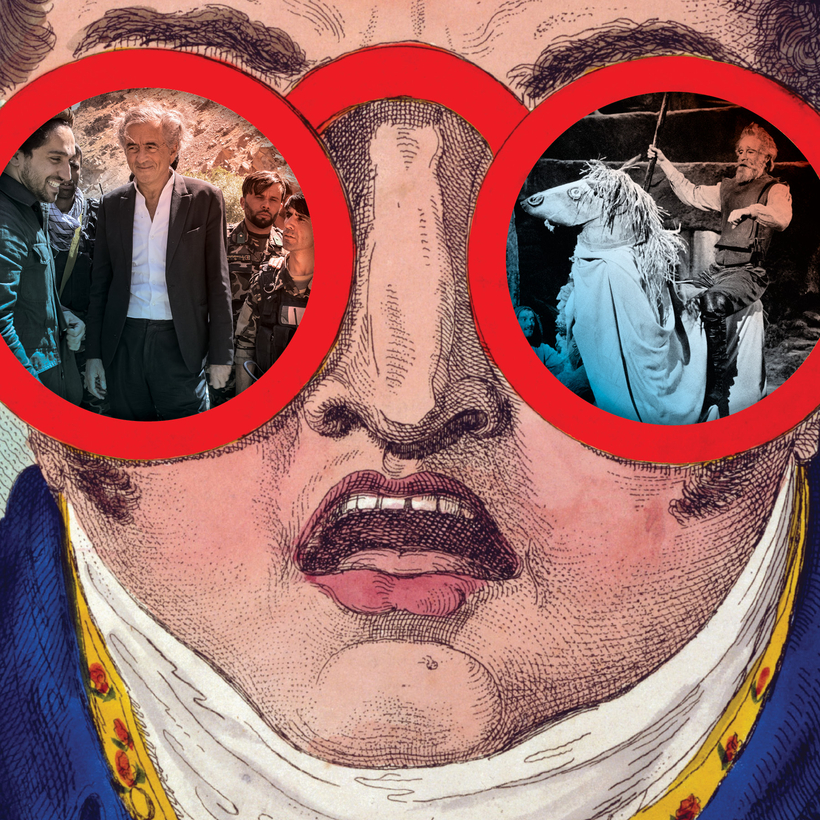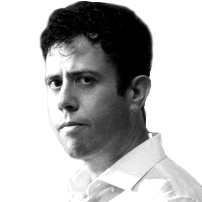There’s an old joke about the French: “Yes, it works in practice. But does it work in theory?” One Frenchman to whom this bon mot most emphatically does not apply is Bernard-Henri Lévy. The peripatetic philosopher, author, activist, and filmmaker—known by his initials, B.H.L.—is as likely to be found dodging bullets in a war zone as he is arguing the meaning of life at a Left Bank café.
Following in the “footsteps of Tocqueville” for his 2006 travelogue, American Vertigo, Lévy journeyed the length and breadth of the United States to report on a country that had become, among his confreres in the European chattering class, “a figure of speech, a cliché.” Five years later, as Muammar Qaddafi vowed to put down a popular uprising and “cleanse Libya house by house,” Lévy smuggled himself into the country, meeting with rebel leaders and persuading then French president Nicolas Sarkozy to advocate a NATO military intervention.
In his latest book, Lévy continues the work he began five decades ago when, answering the call from fellow French writer André Malraux to form an international brigade for Bangladesh during its war of independence from Pakistan, he threw himself into the middle of an international conflict as a thinker, writer, and activist.
The Will to See consists of two parts: a meditation on the intellectual influences that have animated Lévy to become one of the West’s most prominent advocates of humanitarian intervention, and a collection of dispatches from the eight hot spots—eastern Ukraine, Iraqi Kurdistan, and Somalia among them—he visited just before or during the coronavirus pandemic, navigating the byzantine and ever shifting travel restrictions. “Anyone here been raped and speak English?” this is not.
In the book’s opening essays, Lévy invokes a slew of historic and mythical figures, including Don Quixote, T. E. Lawrence, Aeneas, Achilles, and Ernest Hemingway, as inspirations. Such weighty allusions, along with his inherited wealth and flair for the dramatic, frequently invite criticism.
But Lévy is hardly wanting in self-awareness, as is made clear when I ask about his admiration for the literary knight-errant whose combination of extravagance and impracticality engendered a descriptor that some have applied to Lévy’s penchant for embracing seemingly hopeless causes. While conceding that Quixote is a “ridiculous personage,” Lévy explains by phone from his home in Paris that identifying with him “can mean also to be faithful to your dreams. It can mean not to care about success. It can mean to be as vibrant and ardent 50 years after.”

Lévy also has an answer to those who routinely mock him for traipsing through the “African Grozny” of Mogadishu or the “human landfill” of refugees on the island of Lesbos in his immaculate uniform of bespoke Charvet suit and open-necked shirt. He is, he writes, a “writer-reporter who makes it a point of honor never to conceal his identity and refuses to don a khaki jacket, cargo pants, and combat boots in order to ‘fit in.’” In this, he emulates another of his role models, the late Tom Wolfe, who famously wore his trademark three-piece white suit no matter the assignment, whether traveling with a bunch of LSD-addled hippies, crashing a fundraiser for the Black Panthers, or attending college keg parties.
He “makes it a point of honor never to conceal his identity and refuses to don a khaki jacket, cargo pants, and combat boots in order to ‘fit in.’”
Wolfe consciously made himself conspicuous so that he would stand out as a reporter. Lévy similarly puts his cards on the table when he draws a distinction between journalism, with its formal commitment to objectivity, and the more engagé style of reportage he practices. “I am not a journalist, because my slant is the inverse of the journalist’s,” he says. “I never set out on a reporting trip without the firm intention of intervening in what I see and changing what I show.”
At a time when many American reporters have decided that traditional notions of journalistic neutrality are an insidious justification for abetting power, and that to abandon them in favor of “moral clarity” is a sign of virtue, Lévy’s willingness to draw a bright line between activism and journalism is refreshing. “It’s crucial that there is in a democratic society a group of people who keep believing that respect of the fact is a sacred cause,” he says. “If this is contaminated by rampant ideology, it’s a disaster.”
The Will to See can be understood as a sequel to Lévy’s previous book, The Virus in the Age of Madness. Published two months into the pandemic, that crisp polemic was a riposte to those who, “oozing goodness and contrition,” took perverse pleasure in lockdowns as punishment for “the folly of a world that could not continue as it was, a world headed straight into a wall.”
Ever the interventionist, Lévy implores us to break free from the chains of apathy induced by nearly two years of physical isolation. “We were ordered to enclose ourselves in the borders of our country, and the borders of our home, and the borders of our body,” he says. “I was obsessed by this idea that one of the results of this COVID crisis could be a great pushback, a great going backward toward nationalism.
“I hated this idea. It was an insult to the victims of the pandemic.”
Bernard-Henri Lévy’s The Will to See: Dispatches from a World of Misery and Hope will be published on October 26
James Kirchick is the author of The End of Europe: Dictators, Demagogues, and the Coming Dark Age


